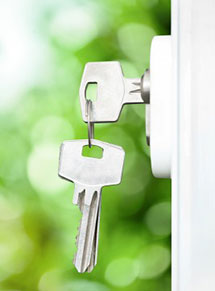Residential and Commercial Locks: Your Most Effective Security Tool

High Quality Locks Keep You Safe
Locks are one of the simplest and most affordable solutions to home and business security, but their effectiveness is often overlooked. The truth is, this simple security measure is enough to dissuade most burglars and meet most residential and commercial lock needs.
Determining the type of lock you need depends on where it will be used. Residential and commercial locations have different security needs, and different kinds of locking solutions. Understanding these differences is critical to making the right lock choice.
Residential Locks
It’s hard to find a person who isn’t familiar with residential locks. The most basic type of residential lock is the doorknob or lever lock. These locks feature a keyhole in the handle that, when used, locks the door. Although they do technically lock the door, they offer poor security. The door is locked in place by nothing more than a short piece of spring-loaded metal. These types of locks are extremely easy to break open with nothing more than a good hard kick.
To increase the basic security of doors in a home, a deadbolt is needed. Deadbolts feature solid steel bolts that slide into the doorframe by several inches. They are not spring-loaded and must be manually moved in to position. Since the bolt extends several inches into the doorframe and is made of solid steel, it is tremendously strong and can withstand a great deal of force. In fact, the doorframe is more likely to break before the deadbolt gives way. When combined with a reinforced strike plate, even the doorframe is made stronger and less likely to give way.
Commercial Locks
Businesses have different lock needs than households, but they also have more options. Although burglary is always a concern, two of the biggest factors when considering commercial locks are building code requirements and the people who have access to the building. A good quality lock is enough to fend off most burglars but the type of door will have an impact on what type of lock can be used. The use of panic bars, crash bars and other types of no-knob exit devices are all dictated by local building codes. Consulting with your local building inspector or your local locksmith is the best way to determine the type of lock you need.
The second most important factor in commercial locks is the people who have access to the building, and how much access they are allowed to have. Businesses have employees that come and go. They have cleaning people. Some companies have frequent turnover. Others may have split-shifts with people coming and going at all hours. Still others may have areas they want to keep off-limits to all but a few staff members. Believe it or not, all of these situations can be handled with a good old-fashioned key lock and a master key system.
When locks are master keyed, a few select people have a key that opens every door in the building. The rest of the staff have keys that only open the rooms they are allowed to be in. Master keying allows business owners to restrict and control the access that employees have to the facility.
A Word About Keys
With all this talk about locks, keys deserve some attention too, after all they are the other half of the locking system. A lock is useless if the key falls into the wrong hands. Sometimes the biggest security lapse is neglecting to re-key or replace locks when a key is lost or stolen.
Even if you haven’t lost a key, it could still have been duplicated. Suppose you were having work done on your home or business and gave a key to the contractor. There’s nothing to prevent the contractor from going down to the local hardware store and getting the key duplicated. One way to prevent unauthorized key duplication is to use unduplicatable keys or keys stamped with “Do Not Duplicate”. Both of these features prevent keys from being copied. Unduplicated keys are a smart move for business owners who need to give keys to their employees. If the keys can’t be copied, there is no need to worry that an ex-employee has an unauthorized copy of the key. This can save the business owner money by not having to re-key or replace locks every time an employee leaves.
The Benefits Of Working With A Professional Locksmith
Working with a local professional locksmith is the best way to make sure you’re getting the right lock for your needs. Locksmiths can provide you with advice, recommend solutions, ensure you’re meeting code requirements, provide the highest-quality locks available and offer professional installation. A local locksmith with a physical shop is also a better choice than a mobile-only locksmith. Commercial locksmiths with a physical location will have locks on display for you to look at and test out, but more importantly, you’ll know where to find the locksmith if you ever have problems with the installation or products. That access is not guaranteed with a mobile-only locksmithing business.
A professional commercial locksmith in Denver saves you time and money and provides you with the peace of mind that comes with knowing you’ve chosen high-quality locks, that are appropriate for the situation, and had them professionally installed. There is no greater sense of security than knowing you can trust your locks to do their job.

 (303) 756-1000
(303) 756-1000  Locks Tips
Locks Tips  Emergency Locksmith Services
Emergency Locksmith Services
 Automotive Locksmith Services
Automotive Locksmith Services
 Commercial Locksmith Services
Commercial Locksmith Services





